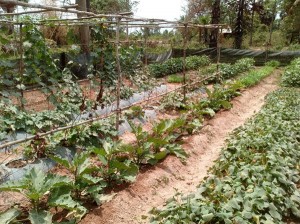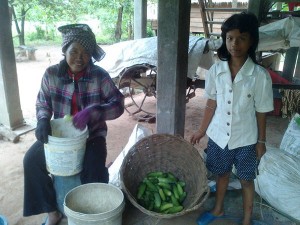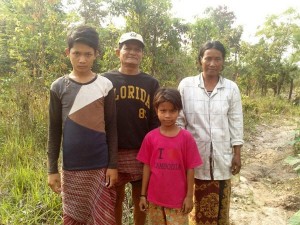Siem Reap, KH – Vegetable gardens have a large impact – 7 Sep 2014
 Mr. SC’s family of six are members of the Food Always In The Home (FAITH) program because their farm’s rice production is not sufficient to feed the family throughout the year. They live in in Peak Snaing Village in the Ankor Thom commune. Mr. SC is 57 years old and married to Leum Mang. They are living with two of their children and two grand-children.
Mr. SC’s family of six are members of the Food Always In The Home (FAITH) program because their farm’s rice production is not sufficient to feed the family throughout the year. They live in in Peak Snaing Village in the Ankor Thom commune. Mr. SC is 57 years old and married to Leum Mang. They are living with two of their children and two grand-children.
The family own a small piece of land for rice cultivation, which he normally plants twice a year in order to produce enough rice to sell and also feed the family. On average, he harvests 400 kg of rice per year. His rice growing technique includes using commercial fertilizer to boost the yield; however, the production is still not enough for all the family’s consumption.
Mr. SC was motivated by seeing how other families in his village were making a success of their vegetable gardens. So in May, 2014 he learned about the benefits of growing healthy vegetables for his family, and how to build and maintain a garden. Since then, he and the garden shop have built a family garden, and he and his wife even extended their garden. The result is that they have been very successful with growing vegetables for their food consumption, have reduced the expenses of buying commercial fertilizer for the rice, and also earned a small income that they use to buy necessities for the family, like fish and meat.
Mr. SC’s story illustrates that the organic vegetable garden program is a small way of helping a farmer, but it can have a big impact on the lives of many people when it is a good example to other members of the community. The garden program’s message is more holistic and more important than simply making money. Its message is healthy living. As SC once said, “If our family is healthy, then we can say we are rich because our health is our capital. If we eat healthy food then we will be motivated to work and we will earn money through our strength”
The SC family was inspired by the vegetable garden philosophy and benefits, and are now collecting green and dry leaves from the garden in order to make compost, growing more vegetables, and increasing the number of chickens.

